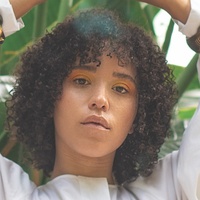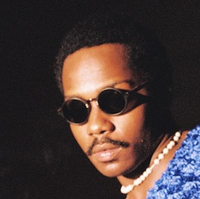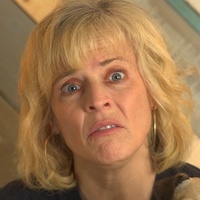As told to Lauren Spear, 2233 words.
Tags: Music, Process, Mental health, Inspiration, Creative anxiety.
On the ups and downs of the creative process
Musician Kaïa Kater discusses swinging between emotional extremes when making something, the value of side projects, and the power of slowing down.Do you have any perspective on your own career?
Sometimes I think I’m a fucking genius and that I’ve reached Mount Olympus and then other days I’m really low. Creatively, I feel like I swing between extremes a lot. Right now, as I’m finishing up a record, I have this feeling of dread, like, “Oh, everything’s wrong and I didn’t do anything right.” And actually, I wore a smiley face shirt today to be like, “Hey, it’s going to be fine. It’s just music.”
It’s hard to stay anchored in that head space though, I imagine.
Yeah, that’s very true. I wonder if, as a songwriter who desires to work in music professionally, I’ve conditioned myself to the chase. I think to a certain degree you need to be like, “All right, this is what I want. I need to finish this record and I want to get this done,” because if you don’t, not a lot of stuff happens. But sometimes I can get to a place where I just put out a record and I’m already thinking about all the things that didn’t happen for me. That’s what I’m trying to have perspective about because sometimes it feels gross. It’s like, “I want more, more, more.” I think what I lack a lot of is that inner equanimity.
Can you think of a moment when you have been able to sit with a feeling of accomplishment?
Right before the pandemic, I finished a tour in the UK for my record Grenades, and I was sitting in a shitty hotel bar with my band and we were set to fly back to North America. At that moment, we had just completed the tour and I felt like I had a handle on the songs. I experienced this moment of intense satisfaction with what I did. I put my record out and I toured it the way I wanted to tour it, and that was incredible. It’s so important to reach that place.
In listening to all your records in succession, Grenades feels like a pivot from your previous, banjo-led records Nine Pin and Sorrow Bound. Because it features a couple of tracks where your father is speaking to you, it also feels deeply personal. I would love to hear about the evolution of your music and how you view it.
I guess playing the banjo, similarly to a lot of other instruments, has a particular identity attached to it. As an Appalachian-associated instrument, you generally play it with fiddle and bass and guitar. I think that as a mixed person—as a Black person playing that music, a lot of it was focused on tradition and about me respecting that tradition. I felt really small in that world because it’s super white. Also, I was like, “Shit, I’m not from here. I don’t have any business playing this music. I better try and play it really well.” Slowly, I started to grow out of that.
Sorrow Bound and Nine Pin aren’t classic string band-y records. I’d have a majority of traditional tunes and then a few of my songs on each successive record. With Grenades, it was the first record where I was like, “Fuck it, it’s going to be all original music. I’m just going to hire a big band and let’s see what happens.” I turned towards what I wanted to do, rather than what I felt like my instrument should dictate and with that came a lot of satisfaction. It’s been a weird thing with the banjo, every once in a while I’m like, “I don’t want to play it anymore. I just want to croon like Sinatra and have a band behind me.”
The banjo and your voice feel like they’re holding hands in your first two records. In Grenades, it’s your singing voice that has now transitioned to the main character.
Grenades was really difficult to make. Not to be melodramatic, but it was a challenging time for me with my relationship with the banjo. And to be honest, I was like, “If I could play any other instrument as intricately, I would play that.” I was really not about it. And you’re right, my banjo is really low in the mix. When I listen back to Grenades, I can see myself struggling with trying to detach these two equal parts that were always hand in hand. I’m trying to decouple them and I don’t know if I succeeded. It’s funny because now I love the banjo again and so it’s all over this new record that I’m making. It’s fucking there and it’s loud. But I think during Grenades, you can hear that I’m going through this feeling of disconnection from the banjo.
What does your new record sound like?
There’s strings, woodwinds, brass, drums, me on banjo, and then some extra synth-y elements. So a lot of it is very full feeling, and I think it’s really just this giant exploration of the things that I love, and that’s been really, really cool. All original songs again, way more personal. I think Grenades, I was writing about my dad and sort of trying to internally figure out how I make sense of myself as the daughter of a refugee. And now I feel so much more able to be honest in my songs and shroud them less. My theme for this record was honesty in grief. Honesty is hard, but songs are the perfect medium for it because you can just sing it and no one’s going to respond to you or have a rebuttal or play devil’s advocate. It’s like you can fire one off and nobody really can say shit about it.
When you write the song about grief and then you perform it, do you ever feel like it changes for you? Do you get desensitized to the original feeling of the song, or is it every time you play it, it brings those original feelings back?
When I was in college and writing, I was like, “I have to write from the depths of my soul.” It was very “college.” I was taking Shakespeare and poetry classes at a time when every emotion felt so strong. As I was writing Nine Pin, I wrote a song called “Rising Down,” which is about the Black Lives Matter movement–specifically police violence and state violence on Black bodies. At the time I was like, “I’ll sing this every night.” Looking back I see myself as being a little bit naive and over idealistic.. And so I would play it and I would have this conversation that I would start on stage about racism and police brutality. It wasn’t long before I realized that playing it night after night in front of majoritarily white audiences wasn’t good for me. There was something weird about having white strangers witness me accessing those feelings.
There are certain audience members who can connect, but I think for me, sometimes when it goes too deep into stuff that I’m not ready to sing about on stage, then there’s a glitch in the Matrix and I don’t feel connected to the audience at all. So I just stopped performing it. Nobody’s telling me that I have to sing this song every night. I’m putting this on myself, and I’m trying to orchestrate this huge revelation to this white audience. I don’t need to muscle this whole thing every night and shoulder it. There are better uses for my time and energy.
Do you feel more guarded in your songwriting now?
There are certain things where I realize it’s okay if I need time to process them. Even if I write the song, there doesn’t have to be a direct pipeline to performing it, which is what I used to think. And that’s really helped a lot because I can recognize the songs that I’m ready to share and the songs that I’m just not.
I also wonder, because we’re encouraged to share so much of who we are on social media, too, we need to be accessible for people to know us and follow us and like us and come to our shows. There is a certain amount of yourself that you should share, but navigating that boundary—it’s an interesting thing especially as I get older.
Is there pressure for you to share intimate parts of your life online or through song?
I’ll put it this way: I think a lot of the time BIPOC musicians, when you release something there’s this sort of automatic assumption that you have a set perspective rooted in racial and cultural trauma. And so it’s like, “Oh, she’s singing about grief. This must be grief about race, or this must be grief about X or Y,” but sometimes it’s just fucking human. I have anxiety and millions of people have anxiety, therefore I can sing about having anxiety. Putting out a record sometimes, the way that people write about it—the way that white journalists write about it is from this perspective of, “Oh, this is because of race.”
Writing Grenades, it was about colonialism, but it was also a story about family. And there are tons of people who have difficult and complex relationships with their parents. A luxury that white artists have is that they can write songs and have this assumed omnipotent and personal perspective. What I’ve learned is that I can be more in charge of saying, “Look, this song is just about anxiety. It’s not that deep.”
Can you talk about what connection feels like for you when it comes to being in conversation with your audience?
It’s such a delicate balance of not cleaving to the audience—not distilling what you feel so that it’s more comprehensible, but trying to have something that creates some sort of tether between you. And that’s hard to do. Right now at the beginning stages of my career, I am opening for headlining acts and so the audience doesn’t always know who I am. When I play, sometimes it doesn’t connect at all, but sometimes you can actually feel when they start listening and connecting with what you’re saying and I think that shit is so cool.
It’s interesting that you say you’re at the beginning of your career because from my perspective, it seems like you’ve done so much already. Do you see your career as linear?
I put out Grenades in 2018 and I’m putting this record out in 2023, so it will be five years. Looking back, I’m like, “Damn, two records.” If I keep going at that pace, then it’s two records every 10 years and that doesn’t feel like enough. But at the same time, I am really liking slowing down and not following this kind of industry guideline which dictates that every two years you should be putting something out and touring.
When you’re on the climb, it feels like you have less agency. I don’t know if I want to go out on a 30-day tour opening for audiences who have no idea who I am, but at the same time I’m told it will build my audience. It’s really confusing. I think I would be at my happiest if I were able to make records that mean something to me, even if they happen less often. If I could work on film projects or creative projects that I’m not the center and the nucleus of, that would be amazing. It’s stressful when my creativity was only linked to the Kaïa Kater show. I feel like that’s so limiting, and I’m so much more than that.
Kaïa Kater Recommends:
Records are all I’m listening to right now, so here are some I’ve been obsessed with lately
Cesaria Evora’s album Cesaria (1995): I love her voice and presence, she is a Cape Verdean legend.
Lhasa de Sela’s album Lhasa (2009): A singer and songwriter for the ages, sang in 3 languages. Lhasa passed away in 2010, very young, of breast cancer.
Andy Shauf’s album Norm (2023): This is a giant true crime concept album. The songs follow 4 characters: a stalker named Norm, the person being stalked (known only as “you”), a bystander, and God himself who (spoiler alert) ends up being quite a letdown to the humans on earth.
Rob Stenson’s album Gold Mountain EP (2013): Great banjo record, just wild playing, every clawhammer banjo player should listen to this.
My fifth and final recommendation is for artists/writers/musicians: take at least one day off from any monetization of your creative practice. Don’t look at emails, don’t teach, don’t write grants, don’t book flights, don’t look up fellowships, don’t learn your DAW, don’t try to write songs you could ever potentially use, don’t edit your bio, don’t take a meeting (even a tiny one), don’t even respond to texts or DMs if they’re about shows or whatever. Don’t do a single thing that is potentially connected to monetizing your art practice. This is a tip I got from Beth Pickens who wrote Make Your Art No Matter What and it’s really helped me create some boundaries in my life with regards to my career.




